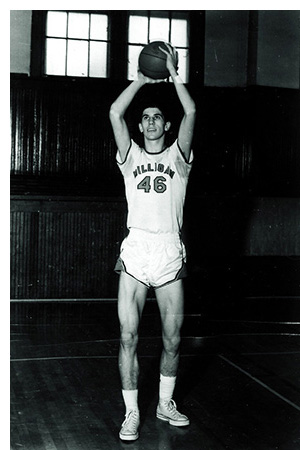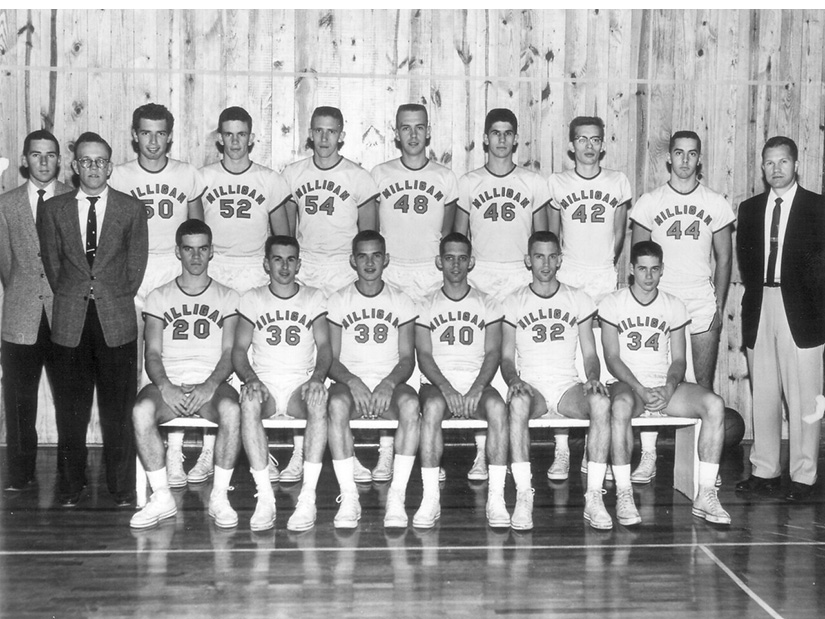By Jake Sutherlin
Milligan University alumnus Delbert (“Del”) William Harris will be enshrined in the Naismith Memorial Basketball Hall of Fame on Sept. 10. That recognition—a testament to his 85 years of excellence on and off the basketball court—helps encapsulate the story of a man whose trophy case is filled with awards and honors.
It actually will be his ninth Hall of Fame induction; Harris previously was recognized by the Plainfield (Ind.) High School, Indiana Basketball, and NAIA Basketball halls of fame, among others.
EARLY LIFE
Harris is a humble man from humble beginnings. His life in basketball began with an inflatable rubber bladder and some rawhide lacing.
It was the early 1940s, a time when rubber was something of a kingly commodity. Wartime rationing put a squeeze on items like sugar, gasoline, meat . . . and rubber. World War II ravaged Europe and strained global markets, but a kindly American G.I. gave 5-year-old Del his first basketball on a small neighborhood street in Indiana.
“Soon after the war, basketball would become a way of life for Midwestern states, but none more so than Indiana,” Harris says.
Indiana’s basketball craze—known as “Hoosier Hysteria”—envelops the state to this day. By the mid-1950s Indiana’s schools had a pronounced basketball culture, with Butler University being one of the state’s crown jewels.
COLLEGE LIFE
It was during the mid-’50s that Harris was offered a full scholarship to play basketball and baseball for Butler. And he planned to do so . . . until about two weeks before the start of the school year. That’s when Duard Walker, the head basketball and baseball coach for Milligan College (as it was then known) in Tennessee, knocked on the front door of the Harris family’s home.

Walker was there at the behest of Dr. Robert Fife, an old family friend who had been the Harrises’ local pastor in Plainfield, Ind., before he moved to teach at Milligan. Del had decided a year or so earlier that he wanted to go to school to be a pastor, so when Walker and Fife combined to convince him to take his talents to Milligan, Del changed his plans and went to Tennessee in the fall of 1955.
“I had formed a good impression of [Milligan] without seeing it,” Harris says. “This was fortuitous in that if I had seen it and compared it to Butler, I likely would not have gone.
“There were only a handful of old buildings [at Milligan] and an antiquated gym that held about three to four thousand people [and had] fan-shaped wooden goals. Butler’s fieldhouse held 15,000. . . . Still, I had no doubts at the time as I believed [Milligan] would be a better place for me to become a pastor.”
Harris loved his time at Milligan and cites the influences of Walker and teammates like Sonny Smith and Roger Sizemore for making his athletic career a joy.
He is grateful for all the Milligan faculty whose servant-based influences aided his personal and spiritual development. Harris bonded with faculty member Dr. Owen Crouch. He remembers attending Crouch’s 6 a.m. Greek class his junior year. Harris also worked as Crouch’s assistant at a local church during his final two years of college and remembers Crouch only ever preached from a literal Greek New Testament.
Following Harris’s graduation from Milligan, he intended to attend seminary at Butler, but Crouch’s encouragement to work a year before attending seminary ultimately helped Harris take his first step toward his hall of fame coaching career.
PROFESSIONAL LIFE
Harris took a gig coaching seventh- and eighth-graders at King Springs Elementary in Johnson City, Tenn. After his squad eclipsed a hundred points in a few games, people started to notice his coaching gift. Harris himself started to see that perhaps coaching—not ministry—would be his way to serve God.
Next he coached at a high school, and then for nine years at Earlham College in Richmond, Ind., where he led the school to three conference titles and a winning record every season.
In 1975 he became an assistant coach for the Utah Stars of the American Basketball Association, which merged with the NBA in 1976. Harris served in the NBA for the next three-plus decades, including head coaching stints with the Houston Rockets, Milwaukee Bucks, and Los Angeles Lakers, with whom he won NBA Coach of the Year in 1995.
He amassed 556 wins as a head coach in the NBA, the world’s premiere basketball league. And he currently serves as vice president for the G-League’s Texas Legends.
Harris’s enshrinement in the Naismith Memorial Basketball Hall of Fame recognizes him as one of the greats, but he takes pride in the lives of the men and women he rubbed shoulders with over the years—people he has been privileged to serve alongside and instruct: “doctors, dentists, a judge, great teachers and coaches, businessmen, trustees, business owners.”
Harris is particularly humbled by a letter he received in 2015. A man who had been a student at one of the schools where Harris had taught and coached told him he had inspired him while he was in school. The man had not played for the coach, but he was inspired by the way Harris challenged his students to be better people and grow. The man shared that he had grown up to be a pastor.
“I am totally indebted to God first,” Harris says, “and then to the excellent players/people that I became associated with. I never imagined the various opportunities that have been given to me.”
Since age 27, Harris says he has never applied or interviewed for a job. Each new chapter has been a step of faith, a new mission field for the kingdom of God.
“I am in debt greatly for the grace and forgiveness promised to believers who seek to follow Jesus, who took our sins to the cross in exchange for his righteousness,” Harris says. “Awards and halls of fame are simply earthly trophies that we can see but are not to be compared with the honor and glory promised to believers in the unseen future.”
Jake Sutherlin, who earned a bachelor’s degree in journalism from the University of Missouri, works as a youth intern for a church in Mississippi.


I was a student at Milligan in the early 1990s. I covered the men’s and women’s basketball teams for the Elizabethton Star. One year Milligan had Alumni Day. Harris was coaching the Milwaukee Bucks at the time and they happened to be playing the Charlotte Hornets that weekend. Coach made the three hour drive from Charlotte to attend the Alumni Day. I had an opportunity to interview him for newspaper. I remember him being so humble and kind. He certainly deserves this Hall of Fame honor.
I was living in Ohio in the 1980s, and there was a quote from Del about comparing the jobs of ministry to coaching. Del told a reporter, “I’d marry them, buried them and baptized them . . . but it was hard to count the wins and the losses!” One of the funniest things I’d heard from a coach. LOL!
Del is so well respected in coaching circles and in business realms. Congratulations to Del on such a well-deserved award!
It was my privilege to serve as Milligan’s basketball public address announcer during the mid-90s, under AD Dr. Walker, mens basketball coach Tony Wallingford and womens coach Rich Aubrey. The influence of Del Harris and Sonny Smith was most definitely still in place at that time. I’m grateful that my son Jason Gillespie felt that influence during his two years at Milligan and is now passing it on to players of his own at King University in nearby Bristol, Tennessee. We should all be reminded that the examples we set will be felt far and wide for years to come.